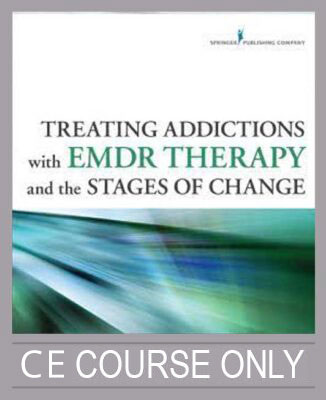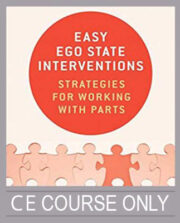Treating Addictions with EMDR Therapy and the Stages of Change, Abel and O’Brien Book Study (12 CE Hours)
$99.00
This Home Study Program offers an opportunity to earn 12 CE hours (EMDRIA, Psychologists, LCSW, LMFT, LMHC, LPC and other master’s level clinicians. Check with state licensing board to confirm acceptance of NBCC credits). The book itself (not included) is the educational content of this program. By passing the CE program quiz developed for this program, you will demonstrate that you have gained knowledge by reading this book.
The book is not included in the purchase of this CE program. To purchase a copy of the book, click HERE or HERE.
Treating Addictions with EMDR Therapy and the Stages of Change
by Nancy J. Abel and John M. O’Brien
book purchased separately
The book addresses the scope of problems relating to addiction and considers the connection between addiction and trauma. Focusing on the use of EMDR therapy in treating addictions, the book also considers traditional models for each stage of treatment so interventions can be individualized according to the needs of each client.
Mental health practitioners must be prepared to treat addiction-related issues–affecting up to 50% of mental health clients — whether or not clients present with addiction as a primary concern. This practical roadmap to the treatment of addictions advocates an underutilized–yet highly effective–method of intervention: eye movement desensitization and reprocessing (EMDR) therapy. It is the first book to integrate the Stages of Change Model with EMDR’s phases for successful treatment outcome.
The authors describe in detail the Transtheoretical Model, tracing its development and theoretical foundations. They discuss each of its stages in depth, presenting and integrating EMDR interventions used by therapists in each stage. The interventions are useful for helping clients at any motivational level. Case vignettes in each chapter illustrate how EMDR techniques are used, and several detailed cases are provided at the end of the book. The appendix features additional resources and EMDR protocols. The text will be useful for therapists currently using EMDR for addiction treatment as well as those using other modalities who are seeking an effective alternative.
Nancy Abel, LCSW, LADC, is an experienced mental health and addictions clinician with over 30 years of clinical experience. She has been the Coordinator of Family Services at Day One in Portland, ME, the Director of Substance Abuse Services at Shoreline Community Mental Health Services in Brunswick, ME and taught for over 14 years at the University of Southern Maine as well as in the Addictions Program at the University of New England. She is currently in private practice in South Portland, ME. Nancy is an EMDRIA Certified Therapist and Approved Consultant.
John M. O’Brien, Ph.D. received his degree in Counseling Psychology from Michigan State University. He previously worked as a high school guidance counselor and at Spring Harbor Counseling in their Partial Hospital and Outpatient Services. John is currently in full time private practice in Portland, specializing in substance abuse, grief, trauma and gay/lesbian issues. In addition, he teaches courses at the University of Maine at Augusta in psychology and addictions. He is the Past President of the Maine Psychological Association. John is an EMDRIA Certified Therapist and Approved Consultant.
|
LEARNING OBJECTIVES:
|
|
|
||||||||||||||||||||||
|
|
|
|
||||||||||||||||||||||
|
Endorsements for Treating Addictions with EMDR Therapy and the Stages of Change “This is a terrific book! Full of amazing information and in-depth considerations. I found it especially helpful when trying to figure out which protocols to consider with this population.” “An incisive and innovative approach to treating addictions. It is extremely clear in its presentation with fascinating case studies. I will be using this book regularly in my practice.” “This will help my practice daily. I use stages of change already. This added depth to my understanding and will guide further treatment planning. Good review with helpful surveys to broaden assessment.”
|
|
|
|
WHAT’S AVAILABLE?
|
Instructions after purchase of book study program:
1. After completing your purchase, you will receive an email receipt verifying your purchase with a link to a quiz based upon the book’s content.
2. For your convenience, you will be provided a downloadable PDF version of the quiz to use while you read.
3. To earn your CE hours, you must answer the quiz questions online.
4. When you complete and pass the CE program quiz, you will be issued a downloadable certificate for EMDRIA, psychologists and masters level professionals
EMDR International Association:
EMDR Advanced Training & Distance Learning, LLC is an EMDRIA Approved Credit Provider (#07002) and maintains responsibility for this program and its content in accordance with EMDRIA standards.
National Board for Certified Counselors:
EMDR Advanced Trainings & Distance Learning, LLC has been approved by NBCC as an Approved Continuing Education Provider, ACEP No. 6709. Programs that do not qualify for NBCC credit are clearly identified. EMDR Advanced Training and Distance Learning, LLC is solely responsible for all aspects of the program.
American Psychological Association:
Advanced Psychotherapy Trainings (APT) is approved by the American Psychological Association to sponsor continuing education for psychologists. APT maintains responsibility for this program and its content.


The book is not included in the purchase of this CE program. To purchase a copy of the book, click HERE or HERE.
Cancellation/Refund Policy: Requests for program purchase cancellation/refund must be in writing to info@emdradvancedtrainings.com no later than 2 weeks after registering for the program. Refunds will be 75% of purchase price. No refund will be given for requests made past this timeframe or for those programs for which the attendee has already obtained CE hours.
Note: you should receive an automatic confirmation email for your order. If you do not, please check your spam filter and/or tabs. If you still cannot find your receipt, please email info@emdradvancedtrainings.com.









